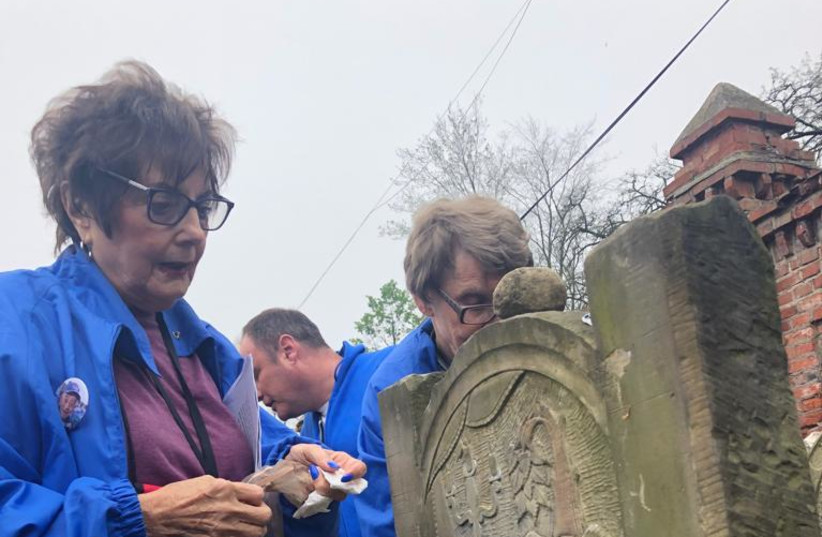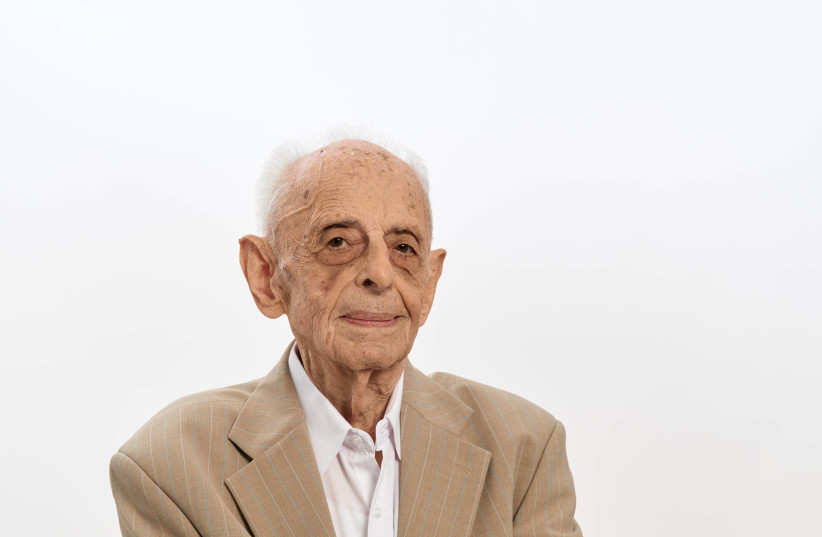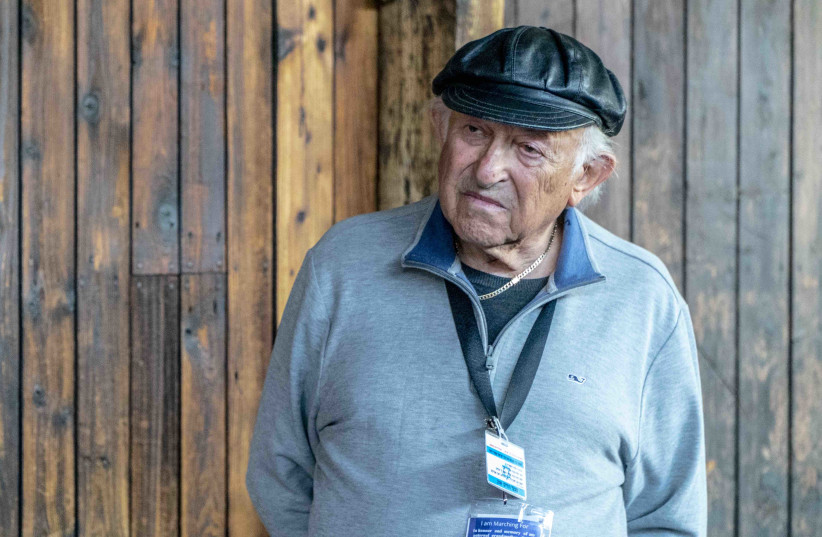Sara Rus – Argentina
I survived to tell what hatred can cause in humanity
I was born in 1927 in Lodz, Poland, under the name Sheine Miriam Laskier. Until the Nazis entered Lodz, I attended the Jewish school and studied violin. In 1940, we were forced to move to the Lodz Ghetto. In 1944, I was taken with my family to Auschwitz. I was separated from my father, whom I never saw again.
I was transferred to Freiberg to work in an aircraft factory and then to the Mauthausen camp, where my mother and I regained our freedom on May 5, 1945. We each weighed less than 30 kilo at liberation. After the war, I married Bernardo, whom I met in the Ghetto, and emigrated to Argentina.
I have participated in the March of the Living for many years and have told my story to hundreds of young students and adults who came with the Argentinian delegation. They will continue to tell our story. It is everyone’s duty and obligation to continue transmitting what happened.
The biggest lesson I learned from the Holocaust is if we do not think that what happens to our neighbor can happen to us, then we have not learned anything from the Holocaust.
Today I am almost 95 years old. I survived! My motto is: “If there is hope, there is life.”

Rosette Goldstein Florida, USA
Marching in Auschwitz – Birkenau is vital to show the world that we are still here
I was born in Paris in 1938. When the situation for the Jews worsened in Paris, my father decided that he must take steps to protect me. He turned to a farmer who lived in the countryside and asked him to hide his little girl. They agreed. My father was caught and deported and sent to his death on convoy number 64 to Auschwitz. I am alive today thanks to Monsieur and Madame Martin and the girls, who were very good to me.
After the war, I went to a camp run by leaders who were working to create the State of Israel, and the sparks of my passion for being Jewish were ignited. I was reunited with my mother after the war and came to the USA.
Today, I am 84 years old and remember much of it like it was yesterday. I talk about it at every opportunity because the younger generations need to know. I have attended the March of the Living for six years, and this year will be my seventh trip.
I would like to share a special moment from the March. The first time I went to Majdanek, I saw all the shoes. I noticed one small red shoe in particular. I wondered about the identity of the child to whom the shoe belonged. I wondered what she could have achieved in this world if she had not been murdered.
I am worried about the future, and this is why I am dedicated to keeping the memory of the Holocaust alive. We must keep talking and keep marching for people of different faiths. I promise to continue to speak until I close my eyes forever.

Gabor Kovacs, Hungary
The March of the Living creates a bridge between the past and the future
I was born in Budapest in 1932. Immediately before the Shoah, I attended high school. The behavior of my teachers varied. Some understood our situation, while others made lists of their students and registered the Jews. We had to wear the yellow star as of April 5, 1944, and that was also the day we received our school report cards. I will never forget the classmates who sat beside me, showing solidarity, who turned away in protest.
I lost my father in the Holocaust. He was deported in October 1944 and perished in Mauthausen in January 1945. My relatives from outside Budapest were deported to Auschwitz. Two cousins and three aunts and uncles were victims of the Final Solution. One of my uncles and one of my aunts were shot in the Danube by members of the Arrow Cross. I spent difficult days with my mother in the Budapest Ghetto. The Red Army liberated us on January 18, 1945.
The Holocaust did not start with the enforced wearing of the yellow star. It began much earlier, with the creation of hatred following World War I. It started with discriminatory laws against Jews. We must not allow discrimination against people. Antisemitism still exists, but its forms and tools have adapted to our era. Creating hatred is unacceptable!
The March of the Living creates a bridge between the past and the future. The March in Budapest that took place before the pandemic was memorable for me because Agnes Keleti, the Jewish Olympic Champion of Hungary, who won ten Olympic medals, also participated, and we finished the commemoration at the Shoes on the Danube Bank Memorial.
My message to the young generation is to be patient and tolerant. They should pass the flames of remembrance to their children and should not forget what they have learned from their parents and grandparents.
Nate Leipciger, Canada
There is no more impactful way to tell the story of the Shoah than on the site where it took place
As a child survivor who encountered the Nazi occupation at age 11, survived two ghettos, was incarcerated in Auschwitz at age 15, experienced seven death and concentration camps, and lost most of my family, I feel a moral obligation to speak on behalf of those millions who did not survive.
The March of the Living has given me a unique opportunity to share my story of suffering, loss and survival with thousands of participants.
There is no more impactful way to tell the story of the Shoah than on the site where it took place. During the March, my suffering – the hunger, isolation, fear, degradation, incarceration, and loss of family – comes back to me, and I am transported back to the reality of what defines the Shoah for me. No narrative can evoke the pathos of visiting the mass grave in a forest where an entire town of 3,500 Jewish infants, children, women and men were murdered in cold blood. No narrative can adequately describe the facility and machinery of death, designed by scientists, architects and engineers for the sole purpose of murder in the shortest time with minimal involvement of the murderers. The visit to the death camps profoundly impacts the participants in the March.
As a survivor and educator, nothing can be more rewarding than telling my story in the barracks of Birkenau and seeing the understanding and compassion written on the tear-stained faces of the participants, knowing they have become the witnesses who will carry the story of the Shoah to the next generation.

I will never forget when I marched on different occasions with our three children, their spouses, and our nine grandchildren with most of their spouses. The Nazis gave us a one-way ticket to Auschwitz, but I left, and we returned with thousands of wonderful, beautiful, intelligent and inspiring young people and our precious families. The most difficult moments in that journey were standing at the ruins of the gas chamber where my mother and my sister took their last painful breaths. My daughter Arla and her husband Zvi and I recited Kaddish for my recently deceased daughter and Arla’s sister Ronda (z”l).
Each and every aspect of the Holocaust is important and indispensable for its understanding and study. However, I reluctantly answer the question about the lessons of the Holocaust with this: Heed the words of those in power who threaten us, our well-being and our lives. If we ignore them, dismiss them as trivial, and become complacent and inactive, those words may become a reality. We must stand up and fight with all available means. This also applies to antisemitism; Don’t ignore it – fight it as we fight all injustices with all resources available to us in a free and democratic state.
My message to the next generation is to learn from the history of our people. Learn not only from our most recent tragedy but also from our triumphs of liberation from slavery, our triumphs over religious intolerance and our victory over forces trying to destroy us. Learn from our recent history of the State of Israel. Be a proud and committed Jew, a Zionist. Be proud of our achievements and contributions to the Jewish people and the world. Stand up to racism and antisemitism, and fight with determination using all available elements of our free society through legislation and education. Stand your ground with truth and defy false narratives. Remember that we have the same rights as all other people – the right to live with dignity, respect, freedom from discrimination, freedom of religion and the right to worship in the manner we choose.
